Editor’s Note: Election Watch is a regular update on the state of the presidential race in Ukraine. The country will elect its next president on March 31, 2019, with a possible runoff on April 21. The Election Watch project is supported by the National Endowment for Democracy. The donor doesn’t influence the content. Go to kyivpost.com for more election coverage.
Ihor Smeshko sometimes sounds like he is running against ex-President Viktor Yushchenko and not any of the 43 candidates, including President Petro Poroshenko, who are his competitors in the March 31 election.
Two dates still bitterly connect Smeshko and Yushchenko: Sept. 4, 2004, and Feb. 4, 2005.
The first date is when Smeshko, then head of the powerful Security Service of Ukraine, or SBU, was among those who dined with Yushchenko when some believe that he ingested a near-fatal dose of dioxin poison. Like so many big crimes in Ukraine, the case has never been solved.
All kinds of theories abound, including that Yushchenko was poisoned days or weeks earlier, but did not feel sick until after the fateful gathering. But everyone who attended the dacha dinner, at one time or another, fairly or unfairly fell under suspicion, including Smeshko, Yushchenko campaign manager David Zhvaniya and ex-Security Service of Ukraine deputy chief Vladimir Satsyuk. Smeshko has always said it’s preposterous to think that he was involved in any way and many discredit this theory.
The second date that sticks out is Feb. 4, 2005, when Yushchenko — less than two weeks after coming to power because of the Orange Revolution — fired Smeshko as SBU chief, after Smeshko’s 17 months in office. Yushchenko’s predecessor, Leonid Kuchma, appointed him to the post on Sept. 4, 2003.
Smeshko’s enmity still burns brightly for Yushchenko. Smeshko says he has no respect for Ukraine’s third president, who served from 2005–2010, and whose incompetent and chaotically corrupt single term ended in 2010 when almost 95 percent of voters rejected his re-election bid.
“Yushchenko came to the power on the slogan of democracy,” Smeshko told the Kyiv Post in an interview on Feb. 1. “But he didn’t do anything to change the authoritarian system which he inherited. He was completely happy with this. He just claimed new faces would come to government. These new faces became even more corrupted than previous ones.”
Yushchenko’s office said the ex-president is too busy to comment.
Poroshenko no better
The situation is no better today after nearly five years of Poroshenko, he said.
“Poroshenko did the same things wrong like Yushchenko,” Smeshko said. “Poroshenko came to the highest level of political power as the loyal ally of Yushchenko.”
Poroshenko was one of Yushchenko’s top allies during the Orange Revolution. After coming to power, Yushchenko made Poroshenko secretary of the National Security and Defense Council and later foreign minister.
“Basically Poroshenko runs the same system which he inherited and even strengthened this authoritarian and untransparent way of governance,” Smeshko said.
No Yanukovych, Medvedchuk?
As far as Smeshko and his supporters are concerned, he already has an honorable place in Ukrainian history for his role in stopping the Interior Ministry from sending its troops to attack the Orange Revolution demonstrators who demanded, and got Ukrainian Supreme Court backing for a re-vote on Dec. 26, 2004, in which Yushchenko defeated Yanukovych by eight percentage points. The efforts of Smeshko and others at the SBU were chronicled in a Jan. 17, 2005, article in the New York Times.
Smeshko paints a picture of all the disasters he could have averted had he been allowed to stay as head of the SBU.
He boldly said that, if the politicians had allowed him to finish his job back then, Ukraine would have never had to suffer Yanukovych’s presidency, which ended when he fled the EuroMaidan Revolution on Feb. 22, 2014.
Smeshko also said that the political career of Viktor Medvedchuk, Kuchma’s ex-chief of staff whom Yushchenko accused of organizing the 2004 voter fraud, would have been cut short if he stayed at SBU longer. After the first round, authorities discovered the existence of a parallel server at the Central Election Commission capable of forging vote totals. This discovery, Smeshko said, was such a “big blow” against the fraud organizers that they stopped trying to cheat. He claimed he was on his way to investigating the fraud. But that would mean going against Kuchma, who appointed Smeshko, and had wanted Yanukovych elected.
Smeshko also claimed he was on the way to solving the 2000 murder of journalist Georgiy Gongadze before he was fired by Yushchenko.
However, investigating that murder would also have meant looking into whether Smeshko’s boss, Kuchma, ordered the journalist to be silenced, as taped phone conversations leaked by one of Kuchma’s security guards suggested. Four police officers, including their supervisor General Oleksii Pukach, were convicted. Many people today still suspect Kuchma’s involvement, an allegation he and his defenders have always denied. To this day, Smeshko has little bad to say about Kuchma — except that he couldn’t choose his boss.
He saves his venom for Yushchenko.
“When Yushchenko came all these cases were stopped,” Smeshko said of the 2004 election fraud, Gongadze and other criminal investigations of the time. “If we had additionally 2–3 months, Yanukovych wouldn’t have a single chance to get back to power.”
But, pressed for details, Smeshko fell silent, citing state secrets. “I know much more than I can tell you, but it’s secret. All operational information is secret.”
He also takes credit for helping U.S. law enforcement make progress in its ultimately successful prosecution of ex-Ukrainian Prime Minister Pavlo Lazarenko, who served from 1996–1997, but who spent eight years in a U.S. prison after his 2006 conviction for embezzling at least $200 million from Ukraine.
But in so doing, Smeshko confirmed the ineffective and politically pliable state of law enforcement then — and now. “This is the only one successful case because we had the political will of the president (Kuchma) which gave to us the green light,” Smeshko said.
Who is Smeshko?
The 63-year-old native of Khrystynivka, a town of 10,000 people in Cherkassy Oblast, Smeshko is a married father of two adult sons. He served for 13 years, from 1992–2005, in Ukraine’s military intelligence division, leaving with the rank of colonel general. Kuchma plucked him from his military intelligence role to become SBU chief on Sept. 4, 2003.
The SBU is the successor to the Soviet-era KGB, holds vast powers with at least 40,000 employees and remains resistant to reforms and attempts to limit its authority to counter-intelligence and counter-terrorism.
Smeshko said that, as SBU chief, he found the organization was “very hostile to military intelligence.” He said he fired some of the old guard as part of the “de-KGBization” of the organization, but pleasantly discovered many in the middle ranks to be patriotic and qualified. He also learned, he said, that some high-level government officials were cooperating “with very famous leaders of international organized crime.”
Smeshko said he sought to cooperate actively with such leading international law enforcement agencies as the U. S. Federal Bureau of Investigation before Kuchma left office and Yushchenko fired him. He left government service for good when fired in 2005.
He started a private consulting and beekeeping business. In the last 14 years, Smeshko said he traded on his professional and academic background to earn a respectable income through consultancy services. He has a doctorate in cybernetics and the ability to speak English, French and German, in addition to Russian and Ukrainian.
He said the $90,000 registration fee that he paid to enter the crowded presidential race amounts to almost 25 percent of his current life savings. According to his first public asset declaration, he claimed $270,000 in cash and some $250,000 more in bank accounts, with a 317-square-meter apartment as well as a house outside Kyiv and land holdings. He says that none of his income has come from government contracts.
Smeshko said that the fee is worth paying because he doesn’t see any challenger, including the incumbent, worthy of being president.
Real democracy
Smeshko faces an uphill battle because he has relatively little money, little media, and also, polls show, little support. But in the Kyiv Post interview at the start of February, Smeshko noted that he went from zero to 2 percent within days of registering as a candidate. And he more recently highlighted another poll showing that more than 4 percent of respondents consider him to be a new face in politics. He is undaunted. Despite his age, he sees himself as the new politician that voters crave.
He will rely on his message of building a true democracy, unhappiness with the status quo and trust in the wisdom of voters to win. He will use social media, campaign stops and interviews with journalists to reach them. He is also playing the long game, like many candidates, in hoping to build a political force that will win seats in the October parliamentary election.
He calls his party the Strength and Honor Civic Movement, a “conservative democratic party.”
“We have a strategy, a professional team and the willingness to go to the end in these elections,” he said. “I do believe in the Ukrainian people and their wisdom. Yes, we have not a lot of money, but this is not an argument. We will stand without oligarchs, without any support of corrupted clans in the power,” he said. “Democracy can’t exist in a country where the majority of the population is impoverished. We rely on the support of the middle class.”
He said that today’s politicians are grouped in “simple feudal parties” with few elected officials who understand what is required to build a democracy with three branches of government — executive, legislative and judicial — that provide a check on each other’s powers.
He also said that political interference is why we have “such a bad situation with law enforcement and justice.” He favors “real decentralization” of government and, he said, and an opposition party with a democratic ideology.
He said Ukraine wouldn’t need the new anti-corruption institutions created — like the National AntiCorruption Bureau of Ukraine, National Agency for the Prevention of Corruption and the Special AntiCorruption Prosecutor — if the existing institutions worked properly.
Ukraine “created a lot of new bodies which would need years to be in real operation,” Smeshko said. “We have the existing bodies which simply don’t have any political guidance.”
Sometimes a military man is the best person to bring democracy to a nation, he said, citing George Washington in America, Charles de Gaulle in France and Mustafa Kemal Ataturk in Turkey.
“It’s the history of our mankind,” Smeshko said. “Who was in many of the countries, the main state builders of democracy? Former military men.”
You can also highlight the text and press Ctrl + Enter


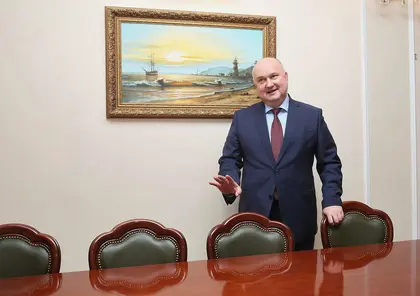
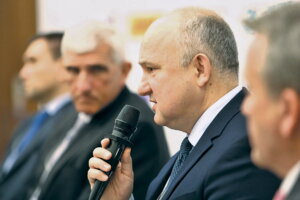

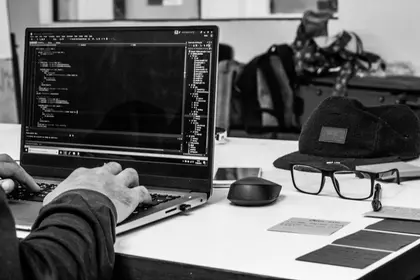
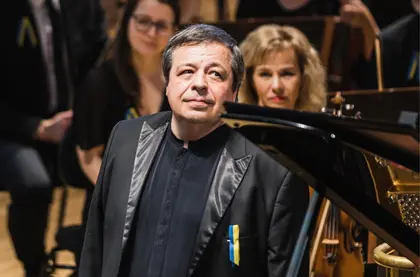
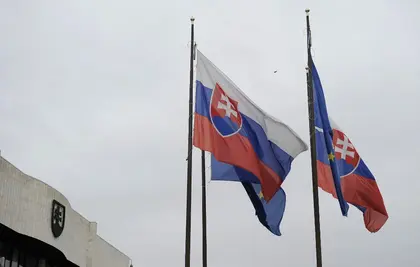
Comments (0)